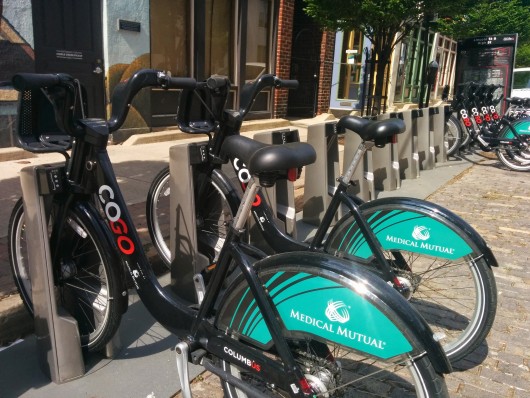
CoGo, a bike-sharing program operated in Columbus by the New York-based company Motivate, is planning to install two new stations near Ohio State’s campus at the intersections of 11th and Neil avenues and 17th Avenue and High Street. Credit: Amanda Etchison / Editor-in-Chief
The distinctive sleek black aluminum bodies of CoGo bicycles might make an appearance near Ohio State’s campus after all, despite not being chosen for the campus bike-sharing program announced earlier this year.
CoGo, a bike-sharing program operated in Columbus by the New York-based company Motivate, was one of five bike-sharing companies that submitted bids for OSU’s on-campus bike-sharing initiative. However, in March, it was the Massachusetts-based bike-sharing company Zagster that was chosen to launch the program with 115 bikes and 15 stations with the goal of expanding to 170 bikes in three years.
The two campus-area CoGo stations are scheduled to be placed at the intersections of 11th and Neil avenues and 17th Avenue and High Street, said Bradley Westall, greenways planner for the city of Columbus.
“Bike share has been a success in the downtown area of the city, and people have responded that they want more stations in the Harrison West, Victorian Village, Weinland Park and Short North neighborhoods. All of these are near OSU, and we’re confident that the expansion will be heavily used,” Westall said in an email. “Our online survey this winter showed a lot of support for expansion towards the south side of the campus area, and we were able to find some really good locations on popular cycling routes.”
The two new stations would be a part of a plan to modify the city of Columbus’ five-year contract with Motivate by adding eight new stations and 80 bikes to the 30 stations and 300 bikes already in the system, according to legislation sponsored by Columbus Recreation and Parks Committee chair Jaiza Page.
An ordinance adding three of these new stations and 45 more bikes was passed by the Columbus City Council on Monday. This expansion is set to cost $149,685.
OSU is set to contribute $99,790 for the two campus-area stations, according to the legislation.
Westall said the money would be used for bike share station equipment.
“Funding to support bike-sharing at Ohio State comes from several different sources within the university,” Dan Hedman, Administration and Planning spokesman, said in an email. “This effort will provide connectivity to the existing CoGo system and enhance the ability for the surrounding community to travel to campus.”
Hedman said although the university is working with Zagster for its on-campus bike-sharing initiative, the inclusion of CoGo bike stations closer to campus will contribute to the growth of the CoGo system throughout Columbus.
“We are committed to working with the city of Columbus to nurture a hybrid system,” he said.
Tim Ericson, CEO and co-founder of Zagster, said the company was “aware of the discussions and supports the addition of CoGo stations” near OSU.
“Our goal — and OSU’s — is to design a system to get students, faculty and staff on, off and around campus while ensuring a steady availability of bikes for all,” Ericson said in an emailed statement. “We welcome the opportunity to work with CoGo for students traveling downtown or for visitors coming to the campus. We’ve had great success working alongside city-wide bike share programs in cities across the country, and we’re confident we’ll have the same experience here.”
Hedman said students using the Zagster bikes on campus will be able to use their BuckIDs, credit cards or debit cards to pay for a membership, projected to cost $35 for students and $55 for faculty and staff for a full year.
“This model allows students to navigate campus and surrounding neighborhoods, providing one-hour checkout on weekdays and three hours on weekends,” he said. “Security features will allow members to take the bicycles anywhere — including off-campus — and securely lock them.”
A 24-hour CoGo pass, which allows for unlimited 30-minute trips, costs $6, according to the CoGo website. An annual membership, which also allows for unlimited 30-minute trips, as well as a membership key and other discounts, is $75.
Zagster is set to provide a variety of bicycles for use by the OSU community. They include commuter, tandem, handle cycle, electric assist, heavy duty and three-wheeled cargo bicycles, which can be used to transport heavier loads, Hedman said. He added that OSU will also receive a grant from the Ohio Department of Transportation that will provide the university with funding for helmets. A bicycle education program for OSU bike riders has also been proposed.
Hedman said the university and Zagster have been surveying students regarding their preferences for bike-sharing locations on campus and are currently finalizing these locations.
Westall said the expansion of CoGo to the university district will help make bike sharing a viable transportation option throughout the city.
“Columbus is making big strides in improving streets and adding trails for biking,” he said. “Bike sharing works, it’s really inexpensive, and we are confident that the more access people have to bikes, the more they can park their cars and take a healthy, fun choice for reaching their destination.”
Khalid Moalim contributed to this article.


